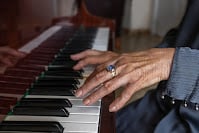Playing Music, Singing Linked to Better Brain Health Later in Life, Study Shows

Playing a musical instrument and/or singing in a group may improve brain health later in life, according to a report in the International Journal of Geriatric Psychiatry. Specifically, the study found that playing a musical instrument, singing, and overall musical ability was associated with significantly better performance in working memory and executive function.
“Promoting the exposure to music during life can increase cognitive reserve and reduce the risk of cognitive impairment in older age,” wrote Gaia Vetere and Gareth Williams, M.D., of the Institute of Psychiatry at Kings College, London, and colleagues. “Public health interventions to promote healthy aging and dementia risk reduction should consider including advice for adults on engaging with music.”
The researchers analyzed data from the PROTECT Study, a project to study aging and brain health in the United Kingdom. As part of PROTECT, participants completed three computerized tests for working memory and one test for executive function, up to three times a year between 2019 and 2022.
Vetere, Williams, and colleagues focused their analysis on a group of 1,107 PROTECT participants who completed the 15-item Edinburgh Lifetime Musical Experience Questionnaire, which asked participants about their experiences playing a musical instrument, singing, listening to music, and self-reported musical ability. The cohort was 83% female with a mean age of 67.82 years.
A total of 89% of participants had experience playing a musical instrument, with 44% playing currently. The majority of participants who reported playing an instrument played either a keyboard or woodwind instrument, and the majority played either one (28%) or two (23%) instruments, although 4% reported playing five or more. The majority of participants had played for a limited number of years in their lives, most commonly five or less (27%).
Participants who reported having played a musical instrument performed significantly better in working memory and executive function tasks, with effect sizes exceeding 0.2. The effect on working memory was particularly seen in individuals who reported playing the keyboard (either alone or in combination with other instruments), with these participants showing significantly more favorable performance in all three working memory tasks.
There was also a significant association between singing and executive function, with an effect size of 0.15. Higher self-reported musical ability was associated with better performance on the working memory test. No associations were seen between listening to music and cognitive performance.
The authors highlighted several limitations of the study, including the overrepresentation of women and musicians. “Future research could make use of a more in-depth capture of musicality, … to investigate other aspects of cognition including attention and episodic memory to explore how they are affected by music,” they wrote.
“There is considerable evidence for the benefit of music group activities for individuals with dementia, and this approach could be extended as part of a health aging package for healthy older adults to enable them to proactively reduce their risk and to promote brain health,” they concluded.
For related information, see the Psychiatric News article “Music Therapy Provides ‘Visceral’ Experience in Patients.”
(Image: Getty Images/iStock/Cavan Images)
Don't miss out! To learn about newly posted articles in Psychiatric News, please sign up here.





